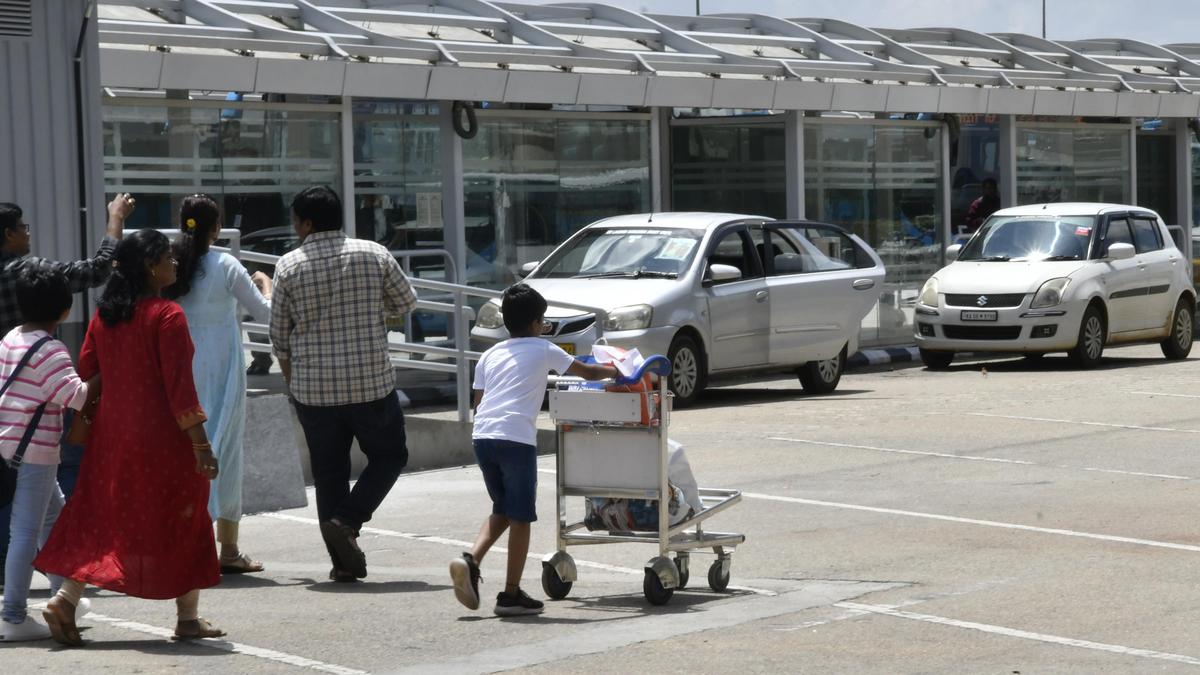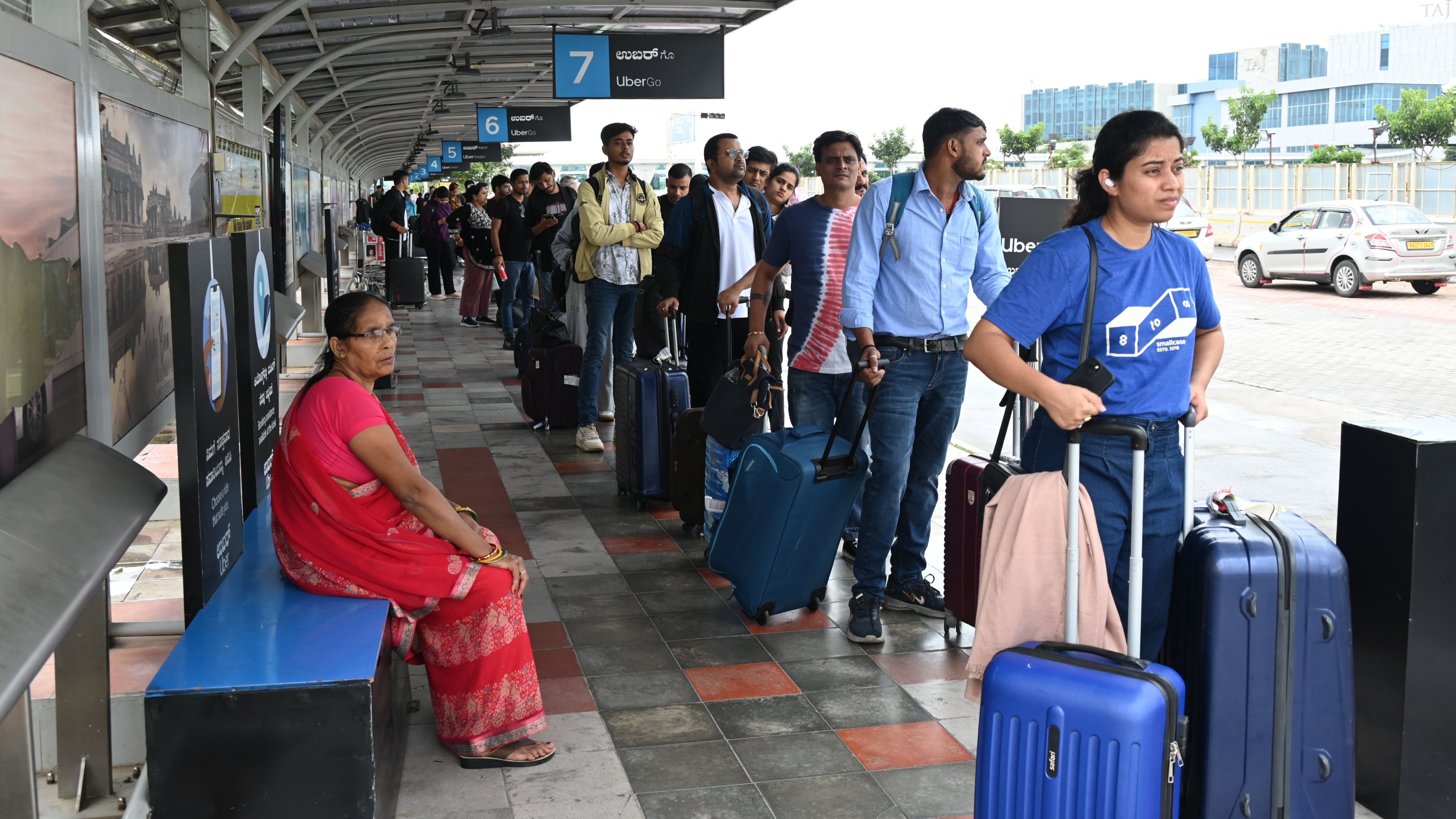Passengers arriving at the Kempegowda International Airport (KIA) in Bengaluru are facing unprecedented hurdles in finding cabs, leading to prolonged waiting hours, last-minute fare hikes, and growing frustration among travelers. What began as sporadic complaints from a handful of passengers has now turned into a widespread issue affecting both domestic and international arrivals, including families, office commuters, students, and elderly travellers who depend heavily on app-based taxis for city transit. Many passengers assert that the shortage has deepened over the last two months, resulting in delays that they describe as “exhausting, unpredictable, and mentally draining.”
At the terminal pickup area, long queues now stretch across barricaded lanes where commuters wait for cabs that sometimes never arrive. Several app-based platform drivers say they prefer intra-city trips rather than airport pickups because of high parking charges and low incentives. For many passengers landing during late-night or early-morning hours, this has turned into a nightmare. A visibly stressed passenger arriving from Kolkata expressed that it took them nearly two hours just to receive a driver confirmation, only for it to be canceled minutes later. The terminal staff acknowledges the recurring complaints but insists that operational decisions lie with private taxi operators.
The pressure on the authorities has intensified as passenger groups begin to organize complaints collectively. Several citizens’ groups that track urban mobility have already drafted petitions, demanding a regulatory framework that forces ride-hailing companies to disclose how many cabs are allocated to the airport at any given time. They argue that transparency can expose whether the shortage is due to corporate incentive policies or driver decisions. Some activists emphasize that a lack of regulation allows platforms to operate without accountability, forcing passengers to deal with uncertainty as a routine part of travel rather than an avoidable breakdown.
Another increasingly discussed solution among airport regulars is the introduction of state-backed shuttle cabs that charge fixed fares. Advocates claim that a government-supported model could reduce dependency on private companies whose surge-based incentives regularly discourage drivers from servicing the airport. These passengers point to international airports that offer subsidized or structured taxi options, insisting that Bengaluru needs similar innovation to match its global aspirations. Many also believe that a competitive market where government services coexist with private taxis would force companies to offer better prices, reducing passenger exploitation.
Airport taxi unions, meanwhile, are pushing back against the assumption that they are abandoning passengers for profits. They argue that taxi drivers are being blamed for a crisis created by pricing strategies of private ride apps. According to them, inconsistent incentive structures compel drivers to avoid the airport to avoid losses. They say the problem would resolve if companies guaranteed minimum earnings for airport pickups, ensuring drivers do not have to choose between financial viability and public service. Their representatives emphasize that without economic dignity for drivers, no regulation can sustainably solve the issue.
Several drivers have also expressed fear over penalties imposed by app-based companies when they cancel trips due to passenger location changes or sudden route preferences. Many drivers allege that they are fined automatically, even if cancellations are not their fault. This, they claim, discourages them from accepting rides from locations where passengers frequently switch platforms, including airports. Passengers waiting outside terminals remain unaware of these dynamics, interpreting driver refusals as apathy rather than economic pressure. Thus, a cycle of mistrust has formed, deepening the divide between passengers and the driver community.
While the government has acknowledged receiving complaints, officials have yet to announce a clear corrective policy. A senior official indicates that discussions are underway to evaluate modifications to parking fees, incentive structures, and regulatory obligations for app services. However, passengers argue that a slow consultation process is out of sync with an urgent crisis affecting thousands daily. Civic bodies also face questions on why public transport alternatives—such as a direct metro link—have not been prioritized even after years of planning discussions. For now, broad promises offer little relief to those stranded at the terminal.
The situation has turned into a reflection of Bengaluru’s struggle to balance rapid urban expansion with fundamental infrastructure needs. The city’s growing reputation as a technology hub sits in stark contrast with its last-mile transport inefficiencies. Passengers say they are tired of hearing about ambitious future projects while suffering immediate distress. Their calls for swift intervention emphasize that mobility must be treated as a public right, not a market-driven privilege. As air traffic grows, the real test for policymakers will lie in whether they protect passenger dignity or continue to rely on unpredictable private solutions that leave travelers stranded.


Rising Complaints as Drivers Avoid Airport Trips, Leaving Passengers With No Options
App-based taxi drivers argue that airport trips are no longer profitable due to long waiting hours before receiving bookings, fuel expenses, and the airport’s parking fees that are deducted from their earnings. Many drivers state that they often spend up to an hour waiting in designated holding areas without assurance of a profitable trip. As drivers reduce their airport availability, demand far outstrips supply, forcing passengers to either wait indefinitely or negotiate with unauthorized operators who charge much higher fares. Some commuters have started walking out of the terminal to catch public buses or request relatives to pick them up after hours of frustration.
Families landing at the airport with children have particularly struggled during late hours when buses are less frequent and metro connectivity remains absent. Parents recount situations where exhausted children had to wait on cold seats with luggage piled around them, adding pressure to already long travel schedules. Office commuters who return from short work trips report missing connecting meetings and facing penalties for late reporting. The emotional distress has been particularly evident among international travellers after long flights, who face a second ordeal before reaching home.
KIA officials explain that the airport sees a 12–15% seasonal increase in passengers during holidays and long weekends, yet the number of cabs servicing the airport has not increased proportionately. Industry representatives argue that the city’s growing air traffic clearly warrants a scalable transport strategy that includes taxi, bus, and metro network expansion. Until a long-term plan is implemented, the burden continues to fall on fliers who are left negotiating transportation at the last minute.
City Transport Chaos Exposed as Bengaluru’s Growth Outpaces Mobility Planning
The chaotic situation has reignited a broader debate on whether Bengaluru’s transportation infrastructure can keep pace with its expansion. The airport authorities state that they have been requesting app-based platforms to provide more drivers during peak hours. However, drivers insist they earn more by operating shorter trips within the city during surge pricing. Drivers also oppose frequent cancellations by passengers who switch platforms to save a few rupees, claiming that these cancellations waste their time and fuel. This tug of war between drivers and passengers has created a near-gridlock situation where neither side gains.
Transport experts believe that the core of the crisis lies in the absence of real-time regulation or structured fare controls at the airport. They claim that private companies dominate decision-making without citywide regulatory oversight, effectively leaving passengers at the mercy of fluctuating driver availability and unpredictable pricing. The city’s airport is one of the busiest in India, yet the lack of seamless last-mile connectivity stands out as a glaring infrastructure gap. Critics point out that the city continues to focus heavily on air travel expansion while paying inadequate attention to how passengers will travel to and from the airport sustainably.
The shortage has also fueled a rise in informal operators who approach passengers near the exit gates offering premium-priced rides. Authorities have not issued an official directive on how these practices will be controlled, leading to concerns over safety and exploitation. Female travellers, especially those arriving late at night, warn that refusing such offers is difficult after waiting for hours. Many insist that the state government must intervene urgently to regulate operations and create safeguards, especially for vulnerable passengers.
Passengers continue to voice demands for guaranteed minimum cab availability and controlled fares during peak hours. A group of frustrated commuters has proposed that the government explore fixed-rate airport taxis, similar to prepaid counters seen at smaller airports. They argue that providing a transparent and predictable option could protect passengers from arbitrary surge pricing and fluctuating driver availability. Without such measures, they say travel costs will continue to depend more on luck than planning.
Transport analysts also recommend reworking parking fee structures to reduce financial burdens on drivers. They argue that incentivizing drivers during peak international arrival windows could stabilize service and lower wait times. Until such changes materialize, passengers are forced to gamble with long waits, high fares, or unreliable alternatives. With Bengaluru’s air passenger volumes projected to keep growing for the next decade, the ongoing cab shortage stands as a sharp reminder that air travel convenience must extend beyond the runway.

For now, stranded passengers wait anxiously under bright terminal lights, watching cabs appear and disappear on their phone screens, hoping that the next acceptance will not be cancelled. As more voices join the complaints and the city’s aviation operations expand, pressure is building on the state and transport authorities to finally treat last-mile connectivity as an essential service rather than a private experiment. If not addressed immediately, what passengers describe as today’s inconvenience could soon become a defining failure in Bengaluru’s transportation planning.
Follow: Karnataka Government
Also read: Home | Channel 6 Network – Latest News, Breaking Updates: Politics, Business, Tech & More


